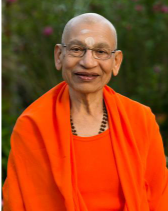
Spirituality

By Swami Viditātmānand Saraswati*
Characteristics of a sthitaprajña
When Bhagavāna said that because of karma yoga, ātmajñāna will arise and the mind will abide in ātmā, a question was raised in the mind of Arjun: what would a jñānī be like who abides in ātmā? What would be his behaviour? What would be his characteristics? Arjun wanted to know this so that he could follow the characteristics of a jñānī and be jñānī himself. Therefore, Arjun asked:
स्थितप्रज्ञस्य का भाषा समाधिथिस्य केशव।
स्थितधी: किं प्रभाषेत किमासित व्रजेत किम्।।2.54।।
O Keśava! What is the description of a sthitaprajña, a person of firm wisdom, one whose mind abides in the self? How does such a person, whose mind is not shaken by anything, speak, sit and walk?
Also read: Spiritual Discourses: Do not side with ahaṅkāra
“Ka” means Brahmā, “a” means Viṣṇu and “īśa” means Maheśa. Thus, the word “Keśava” indicates omniscient paramātmā who is the abode of the three, Brahmā, Viṣṇu and Maheśa. Arjun is asking omniscient Keśava, the abode of all, a question about a jñānī. The one whose prajñā (wisdom) is steadfast and who has a definite knowledge that ‘I am paramātmā’ is called sthitaprajña. There is no projection or agitation in the knowledge of this person who has abided in ātmajñāna. Arjun asks how his language is, meaning, and how others describe him. How does he speak? That means when he is faced with different situations, how does he react? How does he sit? That means when there is no need for doing any transactions with the world, how does he abide in the self? How does he move around? How is his outlook when it is necessary to get in touch with viṣayas or is required to engage in different transactions?
In the response to these questions of Arjuna, Bhagavāna starts describing a sthitaprajña:
The teaching of Bhagavāna began for liberation from grief. The one who is a paṇḍita in the real sense, grief never arises in him. Here in the conclusion, there is a detailed description of such apaṇḍita who is liberated from grief.
प्रजहाति यदा कामान् सर्वान पार्थ मनोगतान्।
आत्मन्येवात्मना तुष्टीः स्थितप्रज्ञस्तदोच्यते।।2.55।।
O Pārtha, when a person gives up all the desires residing in his mind and becomes happy in oneself by himself alone, that person is said to be the one of ascertained knowledge, sthitaprajña.
Jñānī is self-contented
O, Pārtha, when all the desires in the mind are renounced fully, and when one is content in himself by himself, he is called sthitaprajña. When we look into our own hearts, we see that we seldom feel content with ourselves. Generally, all human beings have dissatisfaction with the self. The dissatisfaction of the self is what manifests as dissatisfaction toward the world and īśvara. Most people are dissatisfied in this way. They do not feel content with anything. We have so many demands from the world that the world can never satisfy us. If we get what we want, we feel satisfied for a little while. Then, at the next moment, we will ask for something else. Neither any individual nor any object can give us satisfaction forever. Sometimes we feel that we have complete satisfaction in our minds, there is no dissatisfaction of any kind at all. Many people think like this and also say it to others. However, this notion of satisfaction is illusory. When various necessities are easily fulfilled, we feel that we do not need anything new. We also do not try to achieve anything. However, even when a little need is not taken care of, the dissatisfaction in the mind shows up. When we see that somewhere, someone has something new, the desire to get that thing arises right away.
When the mind has become extremely tāmasa, one is not able to think or even experience the feeling of dissatisfaction. Therefore, he thinks that everything is alright. However, when one feels like something is missing, one definitely becomes aware of the feeling of dissatisfaction. We more or less have dissatisfaction with people, objects, situations, jobs, offices, cars etc. surrounding us. The dissatisfaction that I have about myself is manifested as the dissatisfaction with others. When I am satisfied with myself, the whole world seems to be good. And when I am not satisfied with myself, none of the objects or individuals can give me satisfaction.
To avoid dissatisfaction that is within us, we continually try to bring about change in ourselves and in our surroundings. When we take a look at our life, we realize that we continually try to change something or the other. I am constantly striving to see if my dissatisfaction can be removed somehow if I can make myself feel good, if I like myself, and if I become acceptable to myself. Behind all types of our attempts, there is only one inspiration and that is for self-satisfaction – I become acceptable to myself.
Jñānī sthitaprajña is free from the triumph of removal of dissatisfaction and acceptance of the self. He is satisfied with himself. He accepts himself pleasantly. Therefore, his mind is peaceful, pleasant and free from conflicts.






I have been fortunate enough to attend Swamiji’s classes lectures at tatv tirth. Actually my journey in spirituality started after coming in knowledge and contact of tatv tirth.
With great respect. Pranam. And Hari om.